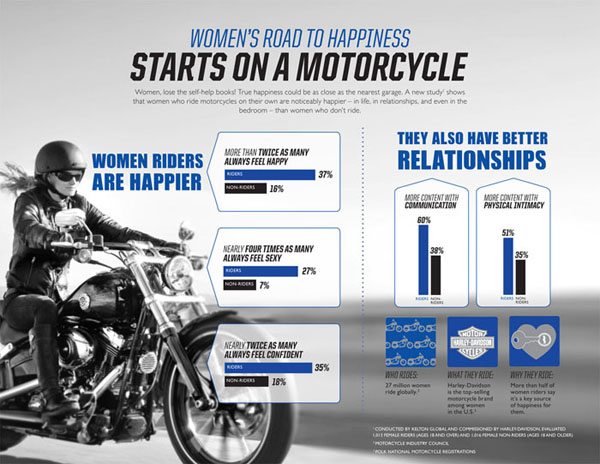Study Reveals Female Motorcycle Riders Feel Happier, More Confident and Sexier Than Women Who Don’t Ride
December 29, 2013 – Harley-Davidson commissioned a study of female motorcycle riders and issued the following press release, edited by webBikeWorld.com.
Who knew that the key to happiness might be where women least expect — out on the open road, and on two wheels.
A new study shows that women who ride their own motorcycles are noticeably happier — in life, in relationships, and even in the bedroom — than women who don’t ride.
The study, conducted by Kelton and commissioned by Harley-Davidson, interviewed 1,013 adult female riders and 1,016 adult female non-riders, and the findings make it clear that riding a motorcycle greatly improves a woman’s feelings of overall self-worth.

Key insights surrounding women who ride motorcycles in comparison to those who don’t include the following:
- More than twice as many always feel happy (37 percent of riders vs. 16 percent of non-riders).
- Nearly four times as many always “feel sexy” (27 percent of riders vs. 7 percent of non-riders).
- Nearly twice as many always feel confident (35 percent of riders vs. 18 percent of non-riders).
According to the study, more than half (53 percent) of women who ride cite their motorcycle as a key source of happiness and nearly three in four (74 percent) believe their lives have improved since they started riding.
“Riding a motorcycle is the ultimate form of freedom and self-expression, so it makes sense that women riders are happier in life and, in general, feel more fulfilled” said Claudia Garber, Director of Women’s Outreach for Harley-Davidson.
“That’s why learning to ride a motorcycle is the perfect gift you can give yourself and the best resolution to make for a truly life-changing new year.”
Riding Improves Relationships
Beyond positively impacting a woman’s sense of self, the study also shows riding can improve relationships. When it comes to romance, women who ride leave non-riders in their dust, being more content with:
- Communication with their significant other (60 percent of riders vs. 38 percent of non-riders).
- Physical intimacy (51 percent of riders vs. 35 percent of non-riders).
Stress can cause tension between significant others, but since more than a third (34 percent) of women riders report that they now feel less stressed after starting to ride, it’s not surprising that 50 percent of them are extremely satisfied with the state of their current relationships.
Where Women Can Get Started
Women can jumpstart their journey to live a more fulfilled life in 2014 and beyond by learning to ride a motorcycle. Women are encouraged to visit the Women Riders section of the Harley-Davidson website.
The site equips women with a number of tools to start their journey toward riding.
It includes testimonials, overviews of motorcycles and gear, and news about special Harley-Davidson Garage Party events designed to give women hands-on demos and tips in a comfortable environment. Women can also search for a Garage Party in their area.
The site also features information about Harley-Davidson’s Rider’s Edge New Rider Course, which is offered at select dealerships around the country.
The course features 25 hours of expert guidance in the classroom, as well as the practice range, where you’ll learn everything you need to know to ride with confidence.
About the Harley-Davidson Female Riders Survey
The Harley-Davidson Female Riders Survey was conducted by Kelton, a leading global insights firm, May 20 to May 28, 2013 among 1,013 adult American women who ride motorcycles sometimes or regularly and 1,016 adult American women who never ride motorcycles, using an email invitation and an online survey.
Results of any sample are subject to sampling variation. The magnitude of the variation is measurable and is affected by the number of interviews and the level of the percentages expressing the results.
For each sample, the chances are 95 in 100 that a survey result does not vary, plus or minus, by more than 3.1 percentage points from the result that would be obtained if interviews had been conducted with all persons in the universe represented by the sample.
The margin of error for any subgroups will be slightly higher.



No Comment